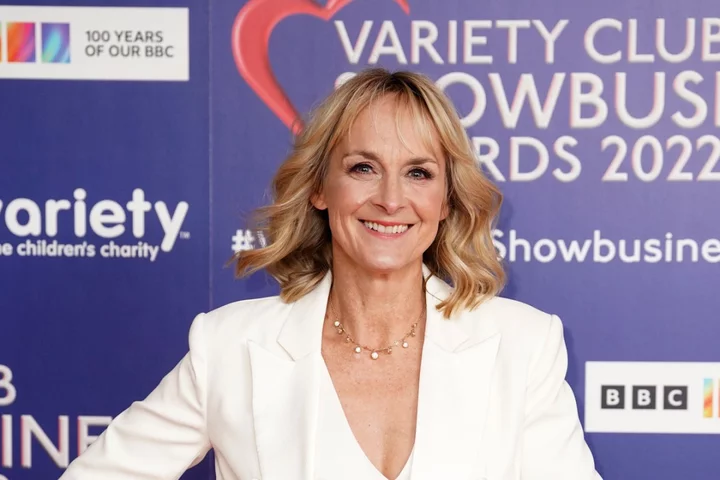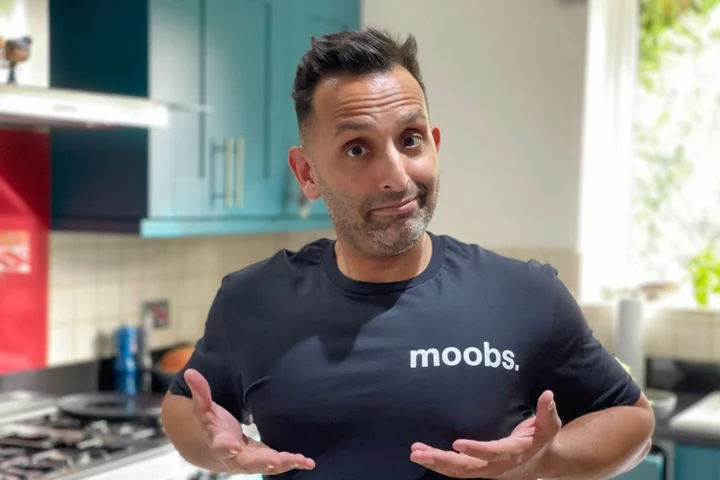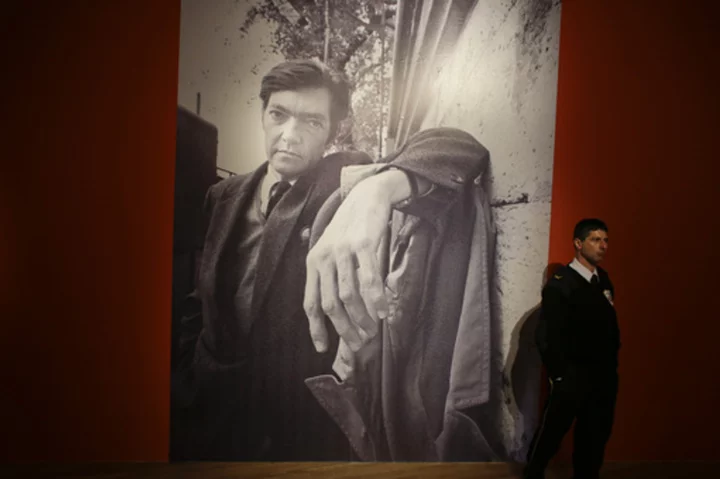
Goodbye to more DVDs? Best Buy plans to phase out sales of physical movies in the coming months
Best Buy is saying goodbye to movie-watching with physical discs
2023-10-14 00:22

Chicago Bets on Big Events and Hotel Revenue to Plug Deficit
Chicago Mayor Brandon Johnson is counting on tourists and residents spending more to have fun, take ride shares
2023-10-14 00:18

Selena Gomez feels she needs to 'give back' after therapy
Selena Gomez has opened up about her journey with her mental health, and how she must "give back" after having therapy.
2023-10-13 21:18

Julia Garner reveals lemon water secret that keeps her looking radiant
'Ozark' star Julia Garner says drinking lemon water each day helps keep her skin healthy, hydrated and radiant.
2023-10-13 20:20

Presenter Louise Minchin: Menopause conversations are no longer taboo – but we need to keep going
Menopause awareness has come a long way in recent years – especially in the workplace. This stands to reason, as nearly 80% of menopause-age women in the UK are in work, according to the Faculty of Occupational Medicine (FOM). In fact, according to ONS figures, menopausal women are the fastest-growing demographic in the workforce. While menopause isn’t challenging for everyone, around three-quarters going through it will experience symptoms – such as brain fog, impaired sleep, hot flushes, anxiety and mood changes – and for one in four women, the impact is severe. Celebrities like Davina McCall have worked hard to tackle taboos and open up conversations around menopause, and a lot has been going on behind the scenes to improve things across healthcare and the workplace. As World Menopause Day 2023 (October 18) approaches, three key figures in the field share their thoughts on the progress so far, and what needs to happen next… Louise Minchin, TV presenter, author and journalist “Progress has definitely been made in respect of people feeling able to speak up. Even if they don’t yet have the answers, people know they can ask the questions – the conversation is no longer taboo, which is brilliant,” says Minchin, who has been at the forefront of menopause conversations in the media. “There’s so much more in the public domain on menopause now, and this enables people to have more of a handle on the topic, and a much better idea where to find help.” In terms of what needs to happen next, she adds: “Employers should be much clearer on how to access training, advice and signposting services that will help their employees work through menopause. Guidelines are all well and good, but [people] need clarity – they need action plans, access to expert trainers and well-informed educators to help them understand and meet their responsibilities and obligations. “It’s important to change the culture, as only when this happens can people open up about what’s happening to them. If you have a supportive and open culture, people feel able to continue in their jobs with the changes that might be needed,” says Minchin – adding that it’s also important to remember “not everyone wants to share or will feel comfortable talking about their situation or their symptoms”, and that needs to be respected too. “We must keep going until we reach the point where we don’t even have to have a conversation about what employers are doing to support colleagues through menopause – because they just are.” Deborah Garlick, CEO of Henpicked: Menopause In The Workplace “In terms of progress, we’ve seen a significant increase in the number of employers taking menopause in the workplace seriously. Seven years ago, no employers had a menopause policy or guidance document. “Today, research suggests around half do, and we have hundreds of employers working towards The Menopause Friendly Accreditation to prove and demonstrate the remarkable, positive impact they’re making for their colleagues,” says Garlick, referencing a scheme set up to show employers ‘have a clear understanding of how menopause can have an effect at work’ and that they ‘care about the wellbeing’ of women at work. “Next we need to see every employer commit to being menopause friendly by putting their menopause policy into action. This is urgent, important and critical for organisational success, particularly with the double threat of our ageing population and the shrinking talent pool,” adds Garlick. “Employers who fail to look after people working through menopause will fall behind.” Rt Hon Caroline Nokes MP, Chair of the Women and Equalities Committee “We’ve made progress on the taboo and stigma, but we need healthcare to up its game. Too many women are still being told they’re too young, it’s depression, you can manage without HRT,” says Nokes, who heads up the cross-party committee set up in 2015 to scrutinise government work and spending around issues impacting women. HRT shortages also need to be tackled, Nokes adds: “You can’t be at your awesome best if you’re anxious about whether your next prescription will be filled – and that is in itself a workplace issue. If we are worried about productivity as a nation, then we need to give menopausal and perimenopausal women the tools to be as productive as possible.” Read More Online apps recommended to manage lower back pain From choppy bobs to fox red, 5 celebrity-approved hair trends for autumn The UK’s first dedicated male breast cancer organisation has launched How Taylor Swift’s style has evolved over the years Model Emily Ratajkowski unveils latest fashion campaign 10 ways to cosy-up your home for an autumnal vibe
2023-10-13 19:59

'I just received a facial look before any big event...' Kim Kardashian shares travel beauty tip
Reality TV star Kim Kardashian admits "it's definitely nice to have a moment of self-care" each day but she can only spare 10 minutes for her skincare regime.
2023-10-13 19:53

Online apps recommended to manage lower back pain
Online apps have been recommended to help people with lower back pain in a bid to tackle NHS waiting lists. Seven platforms have been given the green light for people over the age of 16 to manage their condition in early value assessment guidance published by the National Institute for Health and Care Excellence (Nice). According to the NHS Long Term Plan, lower back pain is the biggest cause of disability and is thought to account for about 30% of GP consultations every year. England affected by long-term back pain" data-source="UKHSA"> UK Health Security Agency (UKHSA) figures show there are 9.11 million people living with long-term back pain in England. Nice said it hopes its guidance will work towards reducing inequalities in care for musculoskeletal conditions. It also hopes the move could reduce NHS waiting lists, as well as bringing down the number for people using medication or waiting for GP or physiotherapy appointments. On Thursday, it emerged that a record 7.75 million people in England were waiting to start NHS treatment at the end of August. The digital platforms our committee has recommended could provide the NHS with extra capacity to get those effected off waiting lists, which vary in length across the country, and into treatment Mark Chapman, Nice Mark Chapman, interim director of medical technology and digital evaluation at Nice, said: “More than two million people suffer from low back pain each year and there are considerable pressures on NHS services to provide the treatment and care to those needing support with this debilitating condition. “The digital platforms our committee has recommended could provide the NHS with extra capacity to get those effected off waiting lists, which vary in length across the country, and into treatment. “We believe these technologies have the potential to offer value for money for the taxpayer, while offering people with low back pain quicker access to get the care they need at a time and place of their choosing.” The platforms recommended for NHS use are ACT for PAIN, getUBetter, Hinge Health, Kaia, Pathway through Pain, selfBACK and SupportBack. Some of the apps are designed for people with new back pain, while others are aimed at those with chronic back pain. These apps are yet another example of how technology can be used help patients get the care they need, when they need it Health minister Will Quince The platforms offer access to multi-disciplinary teams, along with guided exercise videos, and reminder functions for patients to do tasks such as filling in questionnaires. Health minister Will Quince added: “These apps are yet another example of how technology can be used help patients get the care they need, when they need it. “They offer a range of services which will allow patients to manage lower back pain from the comfort of their homes by improving access to musculoskeletal services – which will form a key part of our Major Conditions Strategy. “This will help to reduce pressures on the NHS and can help to cut waiting lists – one of the government’s top priorities – and will help people to live happier, healthier lives.” The technologies recommended in the guidance can be used once they have appropriate regulatory approval and meet the standards within NHS England’s Digital Technology Assessment Criteria, Nice said. The watchdog also recommends lower back pain self-management, exercise, manual therapies, psychological therapy, and combined physical and psychological programmes as well as return to work programmes. Denice Logan Rose, executive director of BackCare (National Back Pain Association), said: “Very many people living with non-specific low back pain feel that they have nowhere to turn for help, they are desperate and are at a complete loss about what they can do to help themselves. “Apps form a significant part of the technology-driven world we live in and if they can be used to help people living with back pain to lead more pain-free and active lives, this is a huge step forward.” Read More From choppy bobs to fox red, 5 celebrity-approved hair trends for autumn The UK’s first dedicated male breast cancer organisation has launched – here’s why it matters How Taylor Swift’s style has evolved over the years Model Emily Ratajkowski unveils latest fashion campaign 10 ways to cosy-up your home for an autumnal vibe 5 must-have bag trends for autumn
2023-10-13 16:25

Israel Latest: IDF Urges Evacuation of Gaza City, Signaling Incursion
Israel called for an evacuation of all civilians in Gaza City and told the United Nations to move
2023-10-13 14:15

Disney Launches World’s First ‘Frozen’ Land in Theme Park Push
Walt Disney Co. is set to open the world’s first Frozen-themed land at Hong Kong Disneyland Resort as
2023-10-13 13:29

The UK’s first dedicated male breast cancer organisation has launched – here’s why it matters
Lorraine regular Dr Amir Khan and This Morning’s Dr Zoe Williams have joined forces to support the launch of the UK’s first ever dedicated male breast cancer organisation. Called Moobs, the organisation was founded by James Richards, 37, who is currently undergoing treatment for the disease after being diagnosed in February, aged 36. Moobs’ main mission is to raise awareness of breast cancer amongst men, and provide a helpful resource for men who get diagnosed. The organisation also runs a monthly support group via Zoom, to ‘help reduce the isolation’ for men affected. “As a male, I’ve always been aware of the risks of prostate and testicular cancer, but I had no idea men were able to get breast cancer – you just don’t hear of it,” said Richards. “In the days following my diagnosis, I was surprised by the lack of tailored support and information readily available around the disease, and much of my treatment plan was based on what was offered to women. “There are differences, but with so few cases and a lack of funding for male breast cancer, we are in danger of isolating those that need support the most.” Around 55,000 women are diagnosed with breast cancer each year, making it the most common form of cancer in the UK. There are also around 400 new diagnoses a year in men – yet awareness of the condition in males is much lower. It’s believed this is contributing to men being less likely to see their doctor when early signs arise, and a 2019 US study found male breast cancer patients have a 19% higher mortality rate than women. As with women, male breast cancer tends to mostly affect older men, aged 60-70. However, it can potentially occur in younger men too, so being aware of the symptoms is important for everyone. Checking for signs When it comes to checking for warning signs, Dr Amir Khan said it’s “very similar” for both men and women. “I always say to women, be ‘breast aware’ – so that’s knowing what’s normal for you, and then being aware of any changes and getting them checked, and it’s exactly the same for men,” Khan told the PA news agency. “[Often] men don’t know that they’ve got breast tissue – but all men have breast tissue, and that means they’re at risk of getting breast cancer. It is a much lower risk than in women, but the risk is still there. “So what I would say to men is, just as often as you check your balls for any lumps, you should be checking your breasts as well. Do them both – balls and breasts – in the shower, once a month.” Khan explained that the “majority of the breast tissue in men is located around the nipple area -so that is the part you need to be hyper vigilant about” when checking for changes. “But saying that, you should be checking the whole of your chest area, right up to the collarbone and under your arm. “As well as that, nipple changes are really important too – so if one nipple has suddenly changed, if it’s pointing inward instead of outward, or if there’s any skin dimpling, any new unexplained rashes around the breast area, or even unexplained persistent breast pain or chest pain, get that checked out.” See your GP While these things don’t mean you definitely have cancer, it’s always best to get things checked with your GP quickly. “We will be able to either reassure you, or make that onward referral. And it is incredibly rare – we’re talking 400 or so men each year diagnosed with breast cancer,” Khan added. “But it’s always better to be safe than sorry, and the longer you leave it [if it is cancer], sadly, the worse the outcome is likely to be. So as soon as you pick anything up, go and see someone.” For more information, visit moobs.uk Read More How Taylor Swift’s style has evolved over the years Model Emily Ratajkowski unveils latest fashion campaign 10 ways to cosy-up your home for an autumnal vibe 5 must-have bag trends for autumn Dawn O’Porter: ‘I fantasise about the other side of menopause’ Everything you need to know about bedbugs as increase in numbers is predicted
2023-10-13 13:21

Unpublished works and manuscript by legendary Argentine writer Cortázar sell for $36,000 at auction
A buyer from Argentina has paid $36,000 for a manuscript of works, including seven unpublished stories, by legendary Argentine writer Julio Cortázar at an auction in the Uruguayan capital, Montevideo
2023-10-13 08:54

Blinken Hears Stories of Horror From Survivors of the Hamas Attack
Secretary of State Antony Blinken embraced survivors of the deadly attacks by Hamas in Israel during his visit
2023-10-13 08:48
